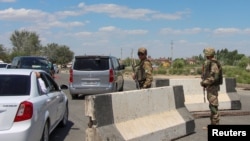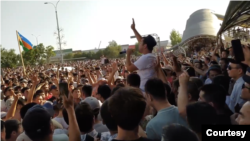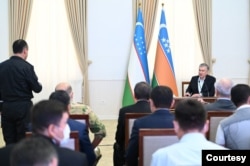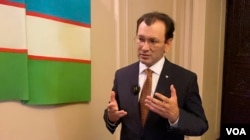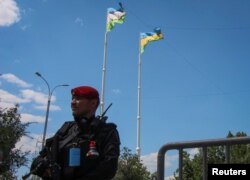Uzbekistan's desert region of Karakalpakstan lies astride the bone-dry Aral Sea. But it has another distinction besides its harsh climate: it has autonomy, and even the right to secede from Uzbekistan by referendum, both guaranteed by the country's 1992 constitution.
But many Uzbeks resent that special status. "While we debate how much of Ukraine Russia controls, we may lose nearly 40 percent of our land," warned Shuhrat Shokirjonov, a blogger, watching unrest in Karakalpakstan.
Karakalpaks took to the streets of Nukus, their administrative center, on July 1-2, to protest constitutional changes penned in the national capital, Tashkent, that would have removed the region's "sovereignty." Demonstrations quickly turned violent, with security forces and citizens accusing each other of bloodshed and destruction.
President Shavkat Mirziyoyev initiated the changes, which would also enable him to remain in power until 2040. But it was the draft provisions on Karakalpakstan's unique status that precipitated the crisis, which has left at least 18 dead and poses the biggest test Mirziyoyev has faced in his six years in power.
He flew to Nukus amid the turmoil and passed the buck onto local leaders. "Why didn't you call me to let me know about people opposing these proposals?" he asked the Karakalpak parliament, which had itself approved the amendments.
And Mirziyoyev quickly reversed course, saying: "No article will ever change without the approval of the Karakalpak people."
Days later, the president fired his chief of staff, Zaynilobiddin Nizomiddinov, allegedly the mastermind of the constitutional changes. VOA sources predict more heads will roll in Tashkent and Nukus, where the parliament chair serves as head of the autonomous republic.
Karakalpakstan has been under tight emergency measures since July 3. Hundreds remain jailed, dozens face criminal charges, and dozens more remain in critical condition.
Promising transparency and justice, Tashkent is promoting its own narrative through domestic media. It says the Karakalpak people exercised their right to express opposition but "criminal groups supported from the outside" hijacked the demonstrations and pushed for secession, even declaring a new leader, Dauletmurat Tajimuratov, who is behind bars. Tajimuratov's supporters believe he never promoted separation but found himself used by separatists for their propaganda.
Washington, Brussels, the U.N., OSCE, Human Rights Watch, and other advocacy groups have called on the Mirziyoyev government to carry out a full, credible and independent investigation.
Javlon Vakhabov, Uzbekistan's ambassador in Washington, said his government is "grateful for America's consistent and unique support of his country's independence, sovereignty and territorial integrity."
Vakhabov told VOA that members of the U.S. Congress have encouraged Uzbekistan to consider international calls, learn lessons from the unrest, and "do the right thing."
He said Uzbekistan is "talking with leading human rights organizations and hearing their concerns and advice."
Vakhabov argued the bloodshed in Karakalpakstan will not hinder Uzbek-U.S. relations. "Every message from Washington has been supportive and empowering. President Mirziyoyev has instructed the entire system to adhere to our laws and stick to our international obligations."
But Tashkent has many questions to answer. In Uzbek media reports from Karakalpakstan, security officers speak of ordinary Karakalpaks as "peaceful protesters" and stress that "the order from the highest level was to absolutely refrain from using force against citizens."
But social media footage, claimed to be from Nukus, shows abuses both by demonstrators and the military. The authorities call some of these unconfirmed videos fakes.
On social media, the public is divided about Karakalpak complaints but equally blames the government for ignoring tensions, failing to prevent violence and restricting internet access there.
"The role of foreign elements" is pushed by both government and citizens, including Mirziyoyev himself, who does not specify any particular state or groups.
Some 2 million residents of Karakalpakstan have long been mired in poverty and environmental despair. Yet others claim these problems are prevalent in most parts of Uzbekistan and should not be an excuse to destabilize the country. Other ethnic groups, such as Uzbek and Kazakhs, also live in Karakalpakstan.
Uzbek blogger Hamid Sodiq points to deeply rooted distress. "Inequality has meant political subjugation for Uzbeks but ethnic discrimination for Karakalpaks," he wrote.
State records show the Mirziyoyev administration has spent at least $1 billion to develop Karakalpakstan since 2017 but the population still largely relies on remittances from Russia and neighboring Kazakhstan.
For Sodiq, more funding of Karakalpakstan may in fact have elevated separatist sentiment by bolstering the middle class. "This should not stop economic reforms. But we need to smartly channel that newly acquired prosperity," he wrote.
"Economic progress and political reforms must go together. Imbalances bring back old grievances. Well-fed people want to be part of political processes."
Uzbek political analyst Kamoliddin Rabbimov told VOA he does not think the Karakalpak crisis will have an impact beyond the country's borders. Uzbekistan's neighbors and major partners, including China, Russia, and Turkey, are backing Mirziyoyev's "swift measures" in Karakalpakstan. "They all are siding with Uzbekistan, supporting its sovereignty and territorial integrity. They understand Tashkent's predicament."
Rabbimov argued that Karakalpakstan's sovereignty "has been one of the biggest challenges for Tashkent for the last 30 years."
When the Soviet Union disintegrated in 1991, Karakalpakstan had already been part of Uzbekistan for 55 years.
"There is no political, geopolitical, legal, or demographic basis for Karakalpakstan to secede even through a referendum as the constitution says. Because in Uzbekistan's unitary system, referendums cannot be held regionally, and any proposal for a national vote must be approved by the Uzbek parliament," Rabbimov said in an interview with VOA.
He also argued that "there is no potential for Karakalpaks to win any referendum, since more than half of the region's population are Uzbeks and other ethnic groups."
He said the government should promote an inclusive national identity. "By taking down regional barriers, and most importantly ending systemic corruption and monopolistic practices, you can dramatically improve the situation."
Rabbimov sees major differences between Mirziyoyev and his predecessor, Islam Karimov.
"Karimov feared his people. He did not tolerate any protest or opposition. Force was justified to put down any uprising, including the 2005 Andijan unrest, which started as a local social-economic tension. Karimov aimed to teach a lesson that no dissent would endure."
Mirziyoyev, observed Rabbimov, is doing the opposite. "He is not afraid of people and cares about Karakalpaks in particular. He's been to Nukus twice to engage the public. The situation is under control. His administration admits the issues and promises to work on them.
"The message we've got from Mirziyoyev is that the government is seeking political and legal solutions to the problem. In my view, he realizes that disproportionate use of force would be a historic mistake."




